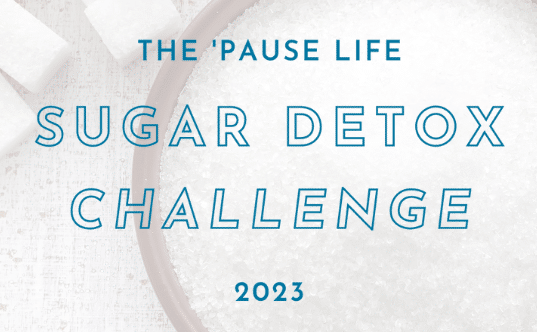Love Sugar? Top 6 Reasons To Eliminate Added Sugars In Menopause
It may surprise you that 22 teaspoons of added sugar are consumed by the average American per day, which adds up to an extra 350 calories per day. Although we often add sugar in the form of table sugar, honey, and syrups to foods ourselves, most added sugar comes from refined and packaged foods. Two of the most serious offenders are sugar-sweetened drinks and breakfast cereals.
Table of Contents
Women should ideally consume no more than 100 calories per day of added sugars (about 6 teaspoons or 24 grams of sugar). To be clear, we are talking about added and chemical sugars, NOT natural sugars found in fruit and vegetables. One can of sugar-sweetened soda contains about that much.
There is no dietary requirement or benefit that comes from consuming added sugar. A good rule of thumb is to avoid items with a lot of sugar added, including skipping foods that label the first or second ingredient as “sugar.” However, the increasing use of alternative sweeteners may make it difficult to decide which ingredients qualify as sugar since many sugar sources have different names.
Besides the excessive weight gain associated with excessive dietary added sugars, there are several menopausal health issues or symptoms that can improve by limiting your sugar intake.
Improve Your Sleep
Sleep disturbances such as insomnia, especially in women after menopause, are extremely common. According to data from the National Institute of Health, sleep disorders are as high as 47% during perimenopause and 60% after menopause. They observed that in women who had more added sugar in their diet, the risk of developing insomnia was greater. For these women, white and brown sugar, high fructose corn syrup, and molasses were the primary source. In females who consumed more whole fruits and vegetables, the chance of developing insomnia was smaller. They hypothesized that the women who consumed more added sugars then had insulin spikes and blood sugar crashes, which disturbed their sleep.
Reduce Hot Flashes
The higher frequency of hot flashes in menopausal women has been associated with elevated blood sugars and insulin resistance. It is understood that refined foods and added sugars quickly increase blood sugar. In a recent study presented at the North American Menopause Society meeting, in women who reported hot flashes 1 to 5 days a week, glucose levels were 33 percent higher than those reported with no hot flashes. In comparison, women who reported hot flashes 1 to 5 days a week were also found to have a 2-fold higher incidence of insulin resistance.
Decrease Risk Of Depression
The idea that a regular, balanced diet will help to boost your mood is a well-established fact. Furthermore, a diet continuously composed of refined foods and added sugar is associated with a greater risk of depression. High sugar diets continually allow one’s blood sugar to fluctuate; consequently, neurotransmitters are continuously dysregulated, and “ON” is constantly signaling inflammatory responses. Needless to say, this is not good for your general well being or your overall mental health.
Decrease The Skin Aging Process
Wrinkles are a natural sign of aging…gradually, naturally, and irrespective of your health, they will surface. Poor food choices can, however, intensify wrinkles and speed up the aging process of the skin. Consuming a diet rich in processed carbohydrates and sugar contributes to the development of advanced end products of glycation (AGEs), a long name for a sugar and protein reaction. It is understood that as we mature, the development of AGEs increases, but it has recently been hypothesized that these products play a key role in skin aging due to collagen and elastin injury. To make for youthful, tight skin, each of these proteins effectively ‘”stretch” the skin. An analysis of middle-aged women (ages 40-74) found that women consuming more added sugars had a more wrinkled appearance than those who consumed less added sugars.

Are You Ready To Break Up With Excess Sugar?
Decrease The Risk Of Disease
Type II Diabetes:
A strong correlation exists between our intake of sugar and the likelihood of developing type 2 diabetes. You are more likely to develop insulin resistance when your body is continuously exposed to elevated blood sugar levels. Insulin is a hormone that influences the level of normal blood sugar. A comprehensive study analyzing 175 countries showed that for every 150 calories consumed through added sugar (AKA: 1 can of soda) per day, the risk of developing type II diabetes increased by ~1.1 percent.
Heart Disease:
Heart disease is the #1 cause of death globally. Obesity and heightened inflammation, elevated triglycerides, high blood pressure, and elevated levels of blood sugar are associated with high sugar diets, both of which are extreme risk factors for developing heart disease. A study in 2014 that analyzed 30,000 US adults’ health data, comparing the average percentage of calories from added sugar, was a perfect example of this fact. In contrast to people who drank 8 percent or less, those who added sugar intake was 17-21 percent of their total calories had a 38 percent higher chance of dying from heart disease.
Fatty Liver
Fructose – normally present in significant quantities in our diet from high fructose corn syrup consumption, is only processed in the liver; this is necessary so the body’s cells can break down glucose and other sugars. The liver turns fructose into glycogen spontaneously, as a way for the body to store energy. This change is fine in principle; the liver has a limited glycogen storage capacity. When this “cap” is met, the liver converts the extra glycogen into fat accumulated on the liver. This accumulation adds to the growth of the non-alcoholic fatty liver.
Cancer
The main explanation why excess sugar intake contributes to a rise in cancer risk is that sugar increases the risk of obesity, inflammation, and insulin resistance. Three things are all enormous risk factors for the growth of cancer. One research showed that women who ate sweets more than 3 times a week were 1.42 times more likely than those who consumed sweets less than .5 times a week to experience endometrial cancer. However, it is important to remember that the precise connection between the intake of added sugar and cancer is ongoing; further research and study need to be carried out to further understand this dynamic relationship.
Weight And Sugar Addiction
Leptin is the satiety hormone in the body – it signals the brain that you are “full” and diminishes our hunger. The large consumption of high fructose corn syrup (HFCS) found in many sweetened beverages often leads to “leptin resistance” – where our brain never gets the signal that you are full and to stop eating. A recent study found that HFCS increased plasma insulin levels more than glucose, leading to a greater brain response to food. As a result, participants that ingested HFCS, as opposed to glucose, had more hunger, a greater desire for food, and were more likely to give up long-term monetary rewards to obtain immediate high-calorie food. Also, these sugary beverages do not curb your hunger by any means – therefore, you tend to either drink more of the given beverage and make bad dietary choices as your brain gives in to “cravings” easily.
To summarize, you don’t have to “break-up” with sugar, but you can dramatically decrease your sugar intake and cravings by choosing foods that satiate and fuel the body with nutrition. Sugar is addicting; food high in added sugar or high-fructose corn syrup (HFCS) found in packaged foods feeds the addiction. If you are interested in breaking the sugar addiction cycle, the Galveston Diet has the tools and guidance you need to live your best life. Learn more here.






